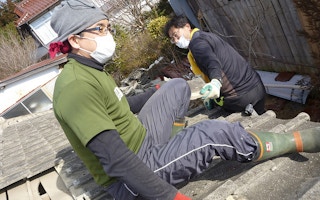Lack of scientific co-operation with other countries has cost Japan “trillions of yen” in expensive solar power because the country did not learn from the experience of other countries before rushing to install it, analysts say.
This is one example they give in a report in Nature journal of how much Japan’s economy has lost through the failure of its scientists to involve themselves in international research.
Five academics from different disciplines at the University of Tokyo − led by Masahiro Sugiyama, director of the Policy Alternatives Research Institute − looked at their country’s scientific and political response to the nuclear disaster at the Daiichi plant in Fukushima after a tsunami struck in March 2011.
Out of touch
They paint a picture of a scientific community out of touch with its international colleagues. In Japan itself, with controversy on every front, “scientists, especially those involved in giving policy advice, lost credibility and the trust of the public”.
Japan is still struggling to decommission the reactors knocked out by the earthquake and tidal wave that overwhelmed Fukushima, yet the country has failed to look outward sufficiently to gain from the experience of other nuclear countries in the region, the authors say.
They suggest that Japanese scientists should publish their research in English to promote international understanding and co-operation.
The fallout from Fukushima prompted Japan to change its energy policy, switching from increasing reliance on nuclear power to renewables, particularly solar energy.
Installed solar capacity more than quadrupled in the first three years after the disaster, and more than 80 gigawatts of power has now been approved – 90 per cent more than Japan’s nuclear capacity.
However, the researchers argue that the cost of this transition has been far greater than necessary.
“
“What the disaster vividly demonstrated is that nuclear plants are susceptible to external events,
and that accident impacts are not contained”Researchers from University of Tokyo
They say: “Under the [Japanese] feed-in tariff, developers rushed to install expensive solar devices, costing consumers trillions of yen that could have been saved by gradual installations made in tandem with cost reductions.
“In Germany, by contrast, there was a clear incentive for solar developers to reduce costs under its fine-tuned tariff scheme with frequent price adjustments.”
They say critics will argue that these were the wrong political decisions and nothing to do with scientists. But that, they argue, is the problem: “Engaged scholarship is a prerequisite for informed policymaking.”
A second example goes to the heart of the nuclear disaster itself and the mistrust of science that has resulted. Before the accident, nuclear experts based their assessments of the risk to the reactors on internal events at the plants, mostly concerning engineering.
The Tokyo researchers write: “What the disaster vividly demonstrated is that nuclear plants are susceptible to external events, and that accident impacts are not contained. They may include the release of radionuclides, with dire environmental effects.
Risk assessment
“The probabilistic risk assessment has therefore been extended beyond nuclear engineering to cover disciplines ranging from seismology and geology to atmospheric science and ecological modelling.”
This problem occurred because, unlike in the US, UK and France, there was limited sharing in Japan before 2011 of information on risk.
The scientists write: “We strongly believe that the events and aftermath of 11 March highlighted a fundamental problem with research in Japan: weak connections between disciplines and between Japan’s scholars and those working in other countries.”
In the UK, they say, 57 per cent of scientific papers were published in co-operation with international co-authors, while in Germany the percentage was 54 per cent. In Japan, it was only 29 per cent, and co-operation across disciplines was also lower in Japan than in other countries.
They say fresh efforts to break this isolation have been made, but they have been fragmented and scattered. Five years on from Fukushima, problems still abound.
“Scientists, social scientists and their funders must engage” if policy-makers are to be well-informed, the authors conclude. “The people of Japan deserve better.”

















